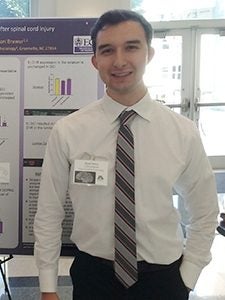Student Profile: Ryan Patton

ECU undergraduate researcher Ryan Patton is studying how chronic pain patients adapt to treatments involving opioids.
Major: Neuroscience and Psychology
Mentors: Dr. Kori Brewer and
Dr. Helen Rodgers
Departments: Department of Emergency Medicine and Department of Physiology
Project Title: “Relationship Between Dopamine and Morphine Responsiveness After Spinal Cord Injury”
Ryan’s laboratory, led by Dr. Kori Brewer, investigates the relationship between spinal cord injury and morphine tolerance. He’s currently interested in dopamine’s role in the development of this injury-induced tolerance through its interaction with the opioid receptor system. His overall goal is to improve neuropathic pain treatment for spinal cord injury patients.
How did you get involved in undergraduate research?
Developing innovative medical treatment through research has always been an interest of mine. Once I understood my personal research interests, I visited ECU’s Multidisciplinary Studies Program in Neuroscience web page and looked for a faculty mentor conducting research in my desired area. After making contact and expressing my interest, Dr. Brewer was gracious enough to allow me into the lab.
Why did you choose your research topic?
Unfortunately, members of my family are forced to live with neuropathic pain due to certain medical ailments. Seeing their struggle only strengthens my resolve to contribute to the literature regarding neuropathic pain. My topic also allows me to understand the most common medical symptom, pain, on a deeper level, which I believe will be valuable in my future medical career.
What’s been your favorite part of conducting undergraduate research?
My favorite aspect of research is learning from Dr. Brewer, Dr. Rodgers and Jacob Yow in the lab. Their experience has taught me invaluable lessons about the joys and challenges of conducting research. Observing their discipline on a daily basis has encouraged me to adopt their work ethic in my own pursuits. Undergraduate research also allows me to study neuroscience in a hands-on manner that is difficult to emulate in the classroom.
What challenges have you faced while conducting undergraduate research?
I believe my biggest challenge has been adapting to unexpected data. I’ve learned to treat all experimental results equally, regardless of whether they support my hypothesis or not. There are scenarios in which I’m forced to digest unanticipated data, consider the next best move, and think on my feet in ways I never could have predicted before working in the laboratory.
Why is your research important for the general public?
Opioids are currently gaining national attention because of their increased use in pain management. My research improves our understanding of how an injury affects our ability to respond to these types of pain medications, which is a critical aspect of maintaining quality of life for many people. The importance of this understanding is certainly heightened for the 1.3 million American patients receiving treatment for a spinal cord injury, especially when that injury leads to chronic neuropathic pain.
What’s your ultimate goal or accomplishment that you hope your research will help you achieve?
Our ultimate goal is to improve the quality of neuropathic pain treatment for patients suffering from spinal cord injury. To achieve this goal, we first need to understand how the injury itself induces opioid tolerance and inhibits pain management, which is something we’re seeing in our data. My project is designed to shed light on this complex relationship. On a more personal level, I hope to use my experiences in the lab to increase my preparedness for a career as a physician.
Do you have any advice for other students interested in conducting undergraduate research?
The best advice I can give is to consider your personal interests prior to starting research. Then search for a mentor whose interests are compatible with yours. Once your work has begun, continue to push through any obstacles you encounter. There will be a learning curve, but the biggest rewards will come from determination.
